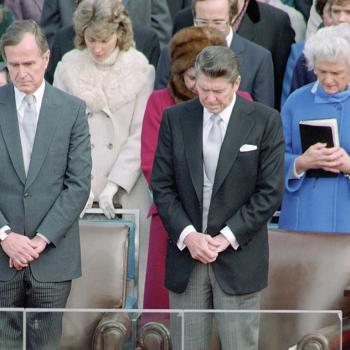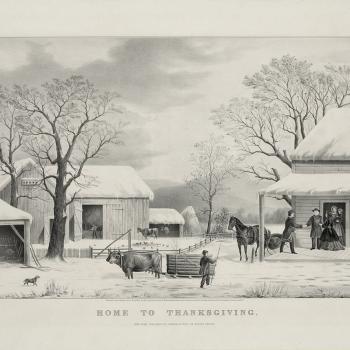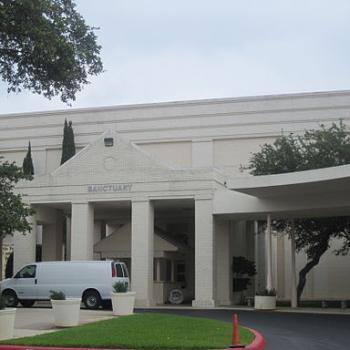Today’s guest post is from John D. Wilsey, Assistant Professor of History and Christian Apologetics, and Associate Director, Land Center for Cultural Engagement, Southwestern Baptist Theological Seminary. He recently published American Exceptionalism and Civil Religion: Reassessing the History of an Idea (IVP Academic).
Is patriotism compatible with democracy? After all, a democracy is supposed to be built on a fundamental commitment to the equality of all people. But patriotism seems to necessitate inequality by preferring one nation over (and often against) another, in a sort of superior/inferior binary construction.
If patriotism does, in fact, divide humanity up on the basis of, say the Chosen and the Other, then how can Americans, who are committed to equality as a founding ideal in the Declaration of Independence, avoid hypocrisy? On the other hand, if Americans should reject patriotism, then how can they justify any unique claims about their identity? And if Americans can make no such claims, then why have a nation at all? In other words, if every nation is exceptional, then how does patriotism have any practical meaning?
These are an important question for Americans who contend for or against the concepts of exceptionalism and patriotism. They are also important for American Christians, who have a divine mandate to look to general human flourishing, not just the flourishing of the American nation. Furthermore, American patriotism is a salient issue now as it relates to the question of immigration, and especially whether or not we welcome Muslim refugees from the Middle East into our country.
Without getting into policy disputes, let us consider the question: can Americans be patriotic and remain committed to the flourishing of all nations? I think the answer is yes, and if we think historically about the question, Alexis de Tocqueville (1805-1859) and Abraham Lincoln (1809-1865) are especially persuasive. Tocqueville argued in his 1856 book on the origins and results of the French Revolution, L’Ancien Régime et la Révolution, that patriotism is a sure way for individuals to pursue general human flourishing. He acknowledged that patriotism does intuitively imply a duty to country that neglects duty toward humanity. Instead, he wrote, the opposite is true. The category of “humanity” was too large, too abstract, and too ideal for people to consider in objective and moral terms, according to Tocqueville. But people do serve the interests of humanity when they look to the benefit of their particular national community. He wrote, “I am convinced that we better serve the interests of the human species in giving each man only a particular country to love, than in wanting to inspire him on behalf of the human species, which, whatever we do, he will only consider with a distant, uncertain and cold gaze.” A person might not consider it practical to express love for humanity as a whole, but she may find it so for her country. But in loving her country, Tocqueville would argue, she loves humanity.
We might consider Christ’s teaching in the parable of the Good Samaritan (Luke 10.25-37) as illustrative of Tocqueville’s idea. Recall that Christ’s point in the parable was to objectify the ideal term “neighbor” by identifying a specific person in need—the traveler on his way to Jericho. “Neighbor” was too abstract and too slippery a term for Christ’s interlocutor, the lawyer in Luke 10.25-29. The lawyer needed a closer, more descriptive, and more local way to understand his moral duty toward humanity as a whole. Tocqueville’s method of explanation is much like Christ’s, particularly in how he explained one’s devotion toward all people via patriotism. Tocqueville localized the idea of “humanity” by pointing to one’s devotion and duty to the national family.
We find a similar idea in Lincoln’s speeches and writings. Lincoln clearly thought that the truest expressions of American patriotism were for the benefit of all humanity. For Lincoln, the Declaration of Independence was the most important founding document. It succinctly and specifically addressed the birthright of every person to equality and natural rights in its assertion that “all men are created equal, that they are endowed by their Creator with certain unalienable rights, that among these are Life, Liberty and the pursuit of Happiness.”
Lincoln believed that the American commitment to equality and natural rights extended to all people and nations. By championing the ideals expressed in the Declaration of Independence, Americans both secured them for themselves and ensured their establishment everywhere in the world. In his August 17, 1858 speech at Lewiston, Illinois, he called the Declaration “that immortal emblem of humanity.” He said that the American founders knew that human equality was directly linked to “the justice of the Creator to his creatures” and that God meant it “to all His creatures, to the whole great family of man.” Furthermore, Lincoln knew that the existence of slavery made a mockery of America’s commitment to its liberal ideals. Two months after speaking in Lewiston, Lincoln said in Peoria, Illinois, “I hate [slavery] because it deprives our republican example of its just influence in the world—enables the enemies of free institutions, with plausibility, to taunt us as hypocrites—causes the real friends of freedom to doubt our sincerity, and especially because it forces so many really good men amongst ourselves into an open war with the very fundamental principles of civil liberty . . . .” Interestingly, Lincoln here drew a distinction between American citizens and the world. American citizens were the ones “forced into open war” with each other over the issue of slavery. But people watching America from all over the world would see Americans as being hypocrites when it came to their foundational commitment to human equality and freedom, because at the time, they still abided the institution of slavery.
Lincoln famously referred to America as the “last, best hope of earth” in his December 1, 1862 Annual Message to Congress. It seems clear that Lincoln considered the United States to be an exceptional nation, from this statement alone. But the context of this statement was the ongoing Civil War and Lincoln’s proposal to bring hostilities to an end by a process of abolishing slavery. He had a deeply circumspect way of framing the issue of abolition. He had a powerful awareness that the eyes of the world were upon him and the Congress. He said, “We say we are for the Union. The world will not forget that we say this.” Here, he reminded his audience that what they did, or neglected to do, was under close observation by people everywhere. Then he argued that in championing freedom for the slave, they championed freedom for everyone—“In giving freedom to the slave, we assure freedom to the free.” Then, he said that the success or failure of this project was immediately tied to the destiny and example of the American nation: “We shall nobly save, or meanly lose, the last best hope of earth.” For Lincoln, America could only hold this lofty position as long as it was true to its liberal professions.
I hasten to clarify—there is a clear difference between patriotism (which is what Tocqueville and Lincoln represented in their writings and speeches) and nationalism. David T. Koyzis helpfully distinguished between patriotism and nationalism in his book, Political Visions and Illusions: A Survey and Christian Critique of Contemporary Ideologies. He wrote that patriotism is defined as love for country, properly and justly applied—“it is a limited affection for a community of fellow citizens bound together for purposes of government and based in a defined territory” (118). It is not an idolatrous worship of nation, wherein the people view themselves as God’s chosen. Patriotism does not divide humanity up, as Koyzis wrote, “on the basis of pride and tribal selfishness” (105) favoring “the members of the titular ethnic group of those of other ethnic groups” (115). That’s not patriotism, but nationalism. For Koyzis, nationalism is clearly seen in Nazi Germany during the 1930s and 40s. When people think of patriotic loyalty, they should not equate that form of loyalty with its imperialist, exclusionist counterfeit, nationalism.
From Tocqueville and Lincoln—and from Koyzis’ thoughtful reflections—we see that patriotism, in a communal affection for a particular national group, based upon shared commitment to human dignity, equality, and natural rights, with, as Koyzis said, “a dedication to the maintenance of the body politic” (118) is an avenue which leads to general human flourishing. While nationalism is a perversion of patriotism that is indeed incompatible with democracy in its rejection of human equality, patriotism serves to profit and enlarge human civilization.
This is one reason why American exceptionalism, properly defined, can help serve as a model for healthy civic and global engagement. Closed American exceptionalism—the idea that America is God’s chosen nation, divinely tasked for a mission to Americanize the world, that it is morally regenerate and indispensable to the world’s security and stability—is an example of Koyzis’ nationalism. On the other hand, open American exceptionalism is not a religious construct, but a political/social idea animated by the Declaration of Independence, the Bill of Rights, the Gettysburg Address, Lincoln’s Second Inaugural Address, and other foundational documents in the American political canon. Under open American exceptionalism, America serves as an example to the world. America is not innocent of profound wrong, to be sure. Americans are often guilty of repudiating their own founding ideals. But as Americans work to be true to their ideals, they, as Lincoln said, “shall not only have saved the Union; but we shall have so saved it, as to make, and to keep it, forever worthy of the saving.”
The victory of Union arms over the Confederacy in 1865 was an example of how Americans worked to secure the stated aims of their national founding. Their work was imperfect, as the next 150 years have proven. But their patriotic work was not for Americans alone. Their patriotism in 1861-65 served as a benefit to the whole human race.












